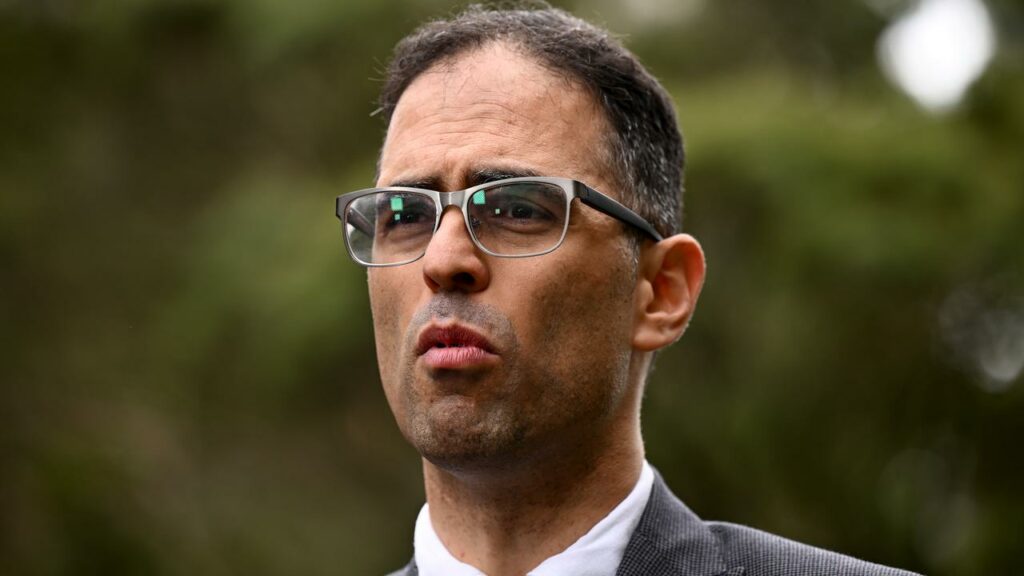Liberals ‘must do better’ bringing in women: Perrottet
Phoebe Loomes and Luke Costin |

Dominic Perrottet admits the NSW Liberal Party needs to recruit more women candidates, after falling short of its own gender targets ahead of the state election.
“We need to do better, and that’s something that I have made very clear to the organisation,” the premier told reporters on Thursday while campaigning in the key electorate of Parramatta ahead of the March 25 poll.
Sixteen days before NSW voters head to the polling booths, the party finalised its candidates, falling short of its own target of 40 per cent female representation.
“It should be higher,” Mr Perrottet said.
Some 39 per cent of the preselected candidates are women, an improvement from the 2019 election, when they took 26 per cent of Liberal spots.
Half the Liberals’ upper house ticket is also filled by women after the premier intervened in party negotiations last year, ensuring three females took spots from men.
The Liberal Party’s make-up in the NSW parliament is less than one-third female, compared with Labor’s 38 per cent.
“We have made a lot of progress and that’s a positive thing,” Mr Perrottet said.
“We have more women running in Liberal seats than ever before.
“Is it good enough? No.”
On the question of embracing a gender quota, the premier said the party had targets, which were important.
The comments came as Mr Perrottet was joined by his wife Helen in Parramatta to announce $30 million in additional funding to boost women’s safety, including better lighting and more CCTV in public spaces.
Meanwhile, Labor’s policy on gambling reform has been labelled “woefully inadequate” by Public Health Association chief executive Terry Slevin.
“NSW Labor must act to improve their current policy position and do so very quickly, because lives and livelihoods are at stake,” Adjunct Professor Slevin said.
“Those most harmed by the current gambling policies are largely in traditionally Labor-voting electorates, most prominently in southern and western Sydney.”
Unions NSW secretary Mark Morey also broke ranks with Labor in January, backing the government’s more comprehensive plan for cashless gaming, instead of supporting a traditional ally.
“This is a system that is geared to take money from working people,” he said.
Labor has committed to a 12-month trial of cashless gaming on just 500 of the state’s close to 90,000 poker machines, as well as banning political donations from clubs.
The policy has also drawn criticism from the NSW Greens and the coalition, which attacked the party for failing to wholeheartedly adopt cashless gaming.
It comes as the NSW Treasury downgraded its forecast for the state budget, saying the deficit is expected to worsen by $1.3 billion over this financial year and the next.
The update shows the estimated deficit for 2022/23 has grown by $668 million to $12.03 billion since the last update in February.
The deficit for the upcoming financial year is now forecast at $7.12 billion, an increase of $615 million.
This takes the total worsening in the state’s books to $1.3 billion, after Treasury predicted a drop in coal royalty revenue for those two years.
The state’s debt for this financial year has jumped by $798 million to $79.2 billion, compared with the February estimate. That debt is now expected to climb to $108.7 billion by 2024/25, after being upwardly revised by $1.3 billion from the half-yearly review.
Shadow treasurer Daniel Mookhey labelled the update “an alarming deterioration in the state’s finances” in the weeks since the most recent budget update.
“The cost of our debt is skyrocketing,” Mr Mookhey said.
“In just a few years’ time we’ll be paying more than $7 billion in interest every year, which is about a billion dollars more than expected at the half-yearly budget review.
“We will be paying more in interest than we do to fund the entirety of the NSW police force.”
AAP